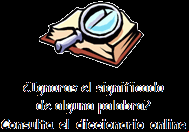33843
|
Study or Learn?
|
 Sugerencias:
Sugerencias:
- Escucha el audio sin consultar el texto. Escucha despus nuevamente el audio (utiliza el "control de audio" o bien el icono "altavoz") leyendo el texto y fijndote especialmente en aqullas palabras o expresiones que no hayas comprendido.
- Puedes descargar el Audio (a travs del icono "altavoz" ![]() ). Utiliza el botn derecho del ratn y "guardar enlace" para descargar el fichero a tu PC, tablet, Smartphone, etc.
). Utiliza el botn derecho del ratn y "guardar enlace" para descargar el fichero a tu PC, tablet, Smartphone, etc.
- Aprovecha tus momentos libres (desplazamientos, ocio, etc.) para escuchar los audios.
- Puedes tambin descargar el Texto (copia el texto a Word, bloc de notas, etc., y gurdalo en tu dispositivo para consultarlo offline cuando quieras).
![]() Escucha el audio
Escucha el audio
(escucha el audio ms de una vez para familiarizarte con los trminos que se introducen y explican)
TAMBIN TE PUEDE INTERESAR:
La Mansin del Ingls. https://mansioningles.juegazos.net
Copyright La Mansin del Ingls C.B. - Todos los Derechos Reservados . -
Cmo puedo desactivar el bloqueo de anuncios en La Mansin del Ingls?



